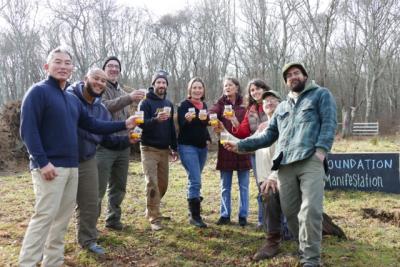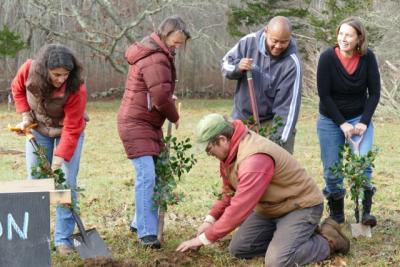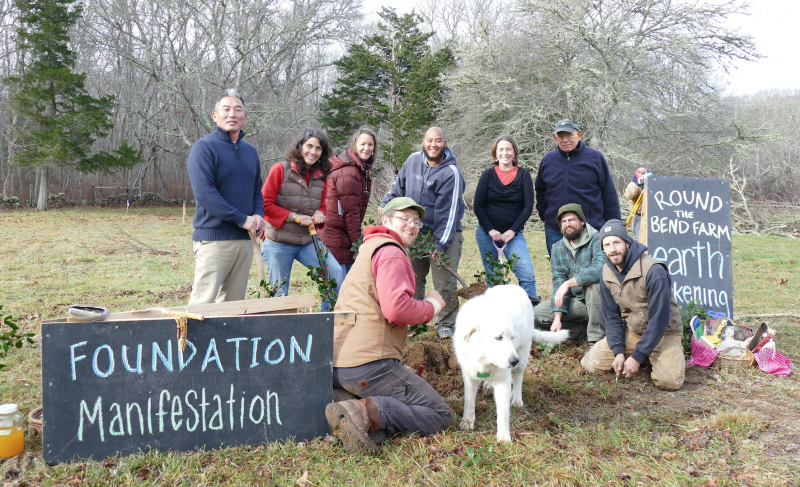Round the Bend Farm breaks ground on education center


Amid the fields of livestock and produce, something new is growing in the soil at Round the Bend Farm: an education center.
This year brought some major changes to the farm. First established in 2007, Round the Bend Farm had previously operated under the Marion Institute, a non-profit focusing on sustainability and social justice. The Marion Institute was also the farm’s fiscal sponsor.
In July the farm, which is located at 92 Allens Neck Road, officially received its non-profit status. This past October, the organization broke away from the Marion Institute.
“It’s been a great year. A huge amount of things have happened,” said Desa VanLaarhoven, the executive director of the Round the Bend Farm. VanLaarhoven spent eight years as the executive director of the Marion Institute before transitioning to a leadership role at the farm at the beginning of 2015.
Perhaps the biggest visible change occurred earlier this month when the organization broke ground on its new building, which will include a space for offices, a library, classrooms and a commercial teaching kitchen.
Not only will students be able to learn from the classes held inside the building, they can also learn about environmentalism through the building itself, including ways to reduce water waste.
The building will be constructed with sustainability in mind, meaning it will have solar panels, heavy insulation, composting toilets and a greywater system. The new building is also symbolic of Round the Bend’s mission, which is, broadly speaking, to help bolster communities through education surrounding food systems.
“We’re passionate about sustainability and the fact that we’re dealing with climate change, food insecurity and food inequality,” said VanLaarhoven. “We feel as all of those things are linked, and, if we could create a more restorative and resilient community in South Coast, we can be a part of that equation. We could support all three of those initiatives.”
The office and library are scheduled to be completed in a year’s time, if not sooner. Construction on the commercial kitchen and the classroom will start in spring 2016 and likely finish a year later.
Previously, classes at Round the Bend were held either outside or inside the farmhouse. The new building will give the group space to host students and hold classes more frequently. The new learning center will be large enough to host all-day field trips for schools throughout the region.
Classes will explore issues surrounding health, food and food equity.
“One of our biggest issues is that there’s a lot of food out there in the United States and much of it is not nutrient-dense,” said VanLaarhoven. “In my opinion, the people that need the food the most are the people who are living in poverty. They need the best food possible so that they’re healthiest. They can’t afford to take a sick day.”
VanLaarhoven believes that food is medicine – and one of the cheaper medicines available. What complicate matters, however, is the cost of fresh, organic produce.
While the education center is under construction, the farm plans to begin to tackle the problem of unequal food access by teaming up with South Dartmouth’s Apponagansett Farm and Mass in Motion, a statewide healthy eating initiative.
Ashley Brister, the owner of Ashley’s Produce and one of the agripeneurs who works at Round the Bend, will be offering 20 to 25 CSA shares for low-income families in New Bedford. Those who participate in the program will get a weekly $20 share for $10. The share will start in early summer, last for 20 weeks and contain seasonal vegetables.
“Mass in Motion applied for a collective grant from Harvard Pilgrim to get subsidized shares to the housing authorities in New Bedford. [The grant] will pay half the cost of a share and the families will pay the rest to get farm-fresh veggies delivered,” said Brister.
Apponagansett Farm will be participating in the program for its second year, bringing the totally number of families supplied with local produce to about 50.
“We’re hoping that, if this is successful, another farm can jump on so we can have 75 shares next year,” said VanLaarhoven. “There’s an incredible group of farmers [in Dartmouth] that believe in food insecurity. We’re all in it together.”














